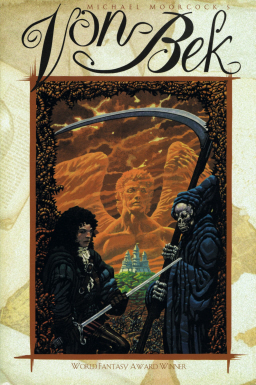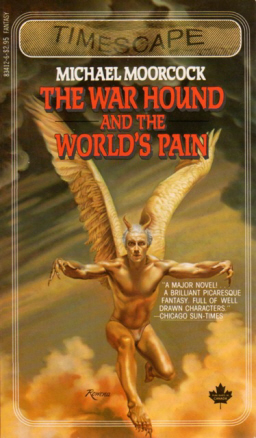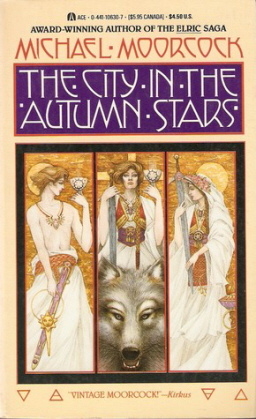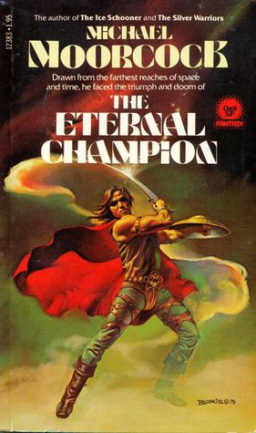Michael Moorcock’s Von Bek: A Review
 No matter what your opinion of Michael Moorcock, you can’t deny that he’s a versatile writer; from the pulpy adventures of Dorian Hawkmoon to the sophisticated high literature of Mother London, this man seems capable of writing anything, and Von Bek, a collection of three stories that focus around the family of the same name and their quest for the Grail, is proof.
No matter what your opinion of Michael Moorcock, you can’t deny that he’s a versatile writer; from the pulpy adventures of Dorian Hawkmoon to the sophisticated high literature of Mother London, this man seems capable of writing anything, and Von Bek, a collection of three stories that focus around the family of the same name and their quest for the Grail, is proof.
This is especially true of the first book: The Warhound and the World’s Pain, which focuses on Ulrich Von-Bek. Here you’ll encounter the same Gothic tones and deep melancholy of the Elric books, the gung-ho adventure of Hawkmoon alongside another healthy dose of Moorcock’s boundless imagination. It is at once questioning and original, daring and clever; unafraid to show the ravages of war, but still enjoyable as simple, leave-your-brain-at-the-door adventure.
A hard to attain but perfect combination. In this tale Lucifer, wanting to redeem himself in the eyes of God, enlists Ulrich Von Bek to retrieve the Holy Grail, or, as he calls it, the ’cure to the worlds pain.’
All throughout this venture, he is hindered by Klosterheim, who has been ordered to prevent him from finding the Grail. Klosterheim’s arrogant nature, intolerable ignorance, and prejudice make him an apt and contemptible rival for our charismatic anti-hero.
I say anti-hero because Von Bek, much like Elric, is a far-cry from Conan or Aragorn in that, rather than having an immovable viewpoint on morals, Von Bek, at least at the beginning, has none. The fact that he only accepts the tangible and takes destruction in his stride makes him a compelling companion, and makes his quest — which surrounds religion and metaphysics — all the more apt, and therefore all the more interesting.
Regardless, one would think his reaction to the paradoxes, contradictions, and the hidden aspects of his quest to be more adverse, but he seems to ignore this and get on with it, which feels like a missed opportunity to explore his character.
 Despite this, Bek’s cynical nature make his simple charisma and wit all the more difficult to fathom. You almost feel bad for liking him.
Despite this, Bek’s cynical nature make his simple charisma and wit all the more difficult to fathom. You almost feel bad for liking him.
Which brings me to another point: the side characters, most of whom are graced with Moorcock’s signature originality. Lucifer seeks redemption in the eyes of his master, and Sendenko is a rogue, trying to hide his nature behind his religion.
And then there’s God. Although he never actually appears, Bek constantly questions his nature; whether he’s cruel, or whether he’s consistent. This side of the book is utterly compelling; a daring analysis of the Christian faith helped along by pitch perfect prose.
Unfortunately, the adventure tends to slip slightly. It occasionally feels padded; some of the fights sometimes pointless, and there are a few missed opportunities which may leave you feeling a little annoyed.
Yet the action, when it revs up, is taut, engaging and, thanks to the prose I mentioned earlier, a grisly joy.
However, a few of the beasts Ulrich encounters, especially those towards the end, dive into the depths of Moorcockian madness with creatures like ‘Lizards bearing monkey riders’ will do more to raise a laugh then they will a wail.
So although it takes a while to pick up, The Warhound and the World’s Pain is an enjoyable, questioning and original read no matter what you want out of it. It’s witty, compelling and tons of fun.
8 out of 10.
The City in the Autumn Stars, the second book in the Von Bek omnibus, is quite surprisingly a very different tale than its predecessor. It chooses metaphysics over adventure. and it’s all the worse for it.
This book takes place a few hundred years after the events of Warhound and focuses on Manfred Von Bek, although references are made to the first Von Bek throughout. Here Manfred, fleeing France, travels to Magdeburg and there meets a rather charismatic rogue by the name of St Odrahan, and the two decide to con the city with a well-conceived swindle.
 After a series of mishaps, they attempt a getaway, but are commandeered by two strangers. One is Klosterheim, the now-depressed antagonist from Warhound, and the other is the Duchesse of Crete Libussa, whom Manfred has fallen head over heels for. They find themselves in the city of the autumn stars and here unravel a plot to reawaken a mythical beast and bring about a new age of man, using a ritual that somehow involves the Holy Grail.
After a series of mishaps, they attempt a getaway, but are commandeered by two strangers. One is Klosterheim, the now-depressed antagonist from Warhound, and the other is the Duchesse of Crete Libussa, whom Manfred has fallen head over heels for. They find themselves in the city of the autumn stars and here unravel a plot to reawaken a mythical beast and bring about a new age of man, using a ritual that somehow involves the Holy Grail.
It’s all a bit sketchy actually; you never quite know whose side is on whose, the motivations of certain characters, how the conflict came about, and why certain things are done. I don’t mean this in a good way; this doesn’t inspire speculation or mystery in any way, sense or form. It doesn’t have that ‘whodunit’ twang. It all feels unintentional, and utterly unexplained, as if Moorcock were just writing for the sake of writing and forgot to add any sort of coherence to the plot.
The story given to us is presented in such a mundane and tedious way that I skimmed over or forgot about it shortly afterwards, a prime example being the introduction; where we have Manfred explaining his flight from France.
In Warhound, the introduction was poignant, taut and to the point. It enchanted me, compelled me, and mystified me.
And here? I was bored. The intro was cluttered with the politics and history of the period when all that was, quite frankly, unnecessary. I don’t read fantasy for a history lesson; I don’t read fantasy for politics. I read fantasy to get away from all that.
Yet all this could be forgiven if everything went along at an agreeable pace, but it doesn’t. Conversations are long, drawn out and often revolve around irrelevant subjects that, again, I didn’t care about. Manfred’s and Odrahan’s swindle should last three chapters at most when it instead drags on for five, because Moorcock insists we have an in-depth report of all the false advertisements they produce, the conversations and deals they make and everything in-between.
It just dragged on for much longer than it should have, and suffered for it. This is before we consider how long it took Manfred to reach Von Bek. Though his journey is exciting at one point, with an intense chase seen with Montsorbier Von Bek’s rival, the rest of the trip is, for the most part, uneventful and — guess what? — tedious.
Yet it’s not all doom and gloom, and the book does have a few saving graces. The prose is still captivating, particularly towards the end. The characters are still excellent and the touches of irony are even stronger here than they were in Warhound and the action, when it comes, is heart-pounding, tense, and excellently written.
Verdict: 4 out of 10. Though there are a few touches of genius, that can’t save you from the boredom this book promises.
The Pleasure Gardens of Felipe Sagittarius, the third story in the Von Bek omnibus, is strange, quirky, and oddly charming, if very different from what one would expect in an Eternal Champion tale.
 What we have here is more of a throwaway short story (it’s only around fifty pages) as opposed to a fully-fledged fantasy epic, but that doesn’t diminish its quality; here Moorcock lets his boundless imagination run free and, once again, we get the usual hybrid of genius and insanity.
What we have here is more of a throwaway short story (it’s only around fifty pages) as opposed to a fully-fledged fantasy epic, but that doesn’t diminish its quality; here Moorcock lets his boundless imagination run free and, once again, we get the usual hybrid of genius and insanity.
Pleasure Gardens takes place in an alternative history, in the aftermath of World War II, except this is a war Adolf Hitler didn’t start; in fact, this is a war Hitler didn’t have much to do with at all. Instead he’s a simple police captain. The story is full of little clever touches like this; Albert Einstein is a neglected, unappreciated genius rotting away in bars and pubs, whilst Eva Braun is cheating on old Adolf with her ex-lover. It’s quite interesting to see the fates of different historical figures, and it adds another degree of charm to an already charming story.
The story itself follows Minos Von Bek as he investigates a murder in the Police Chief’s Garden. This garden, tended by Felipe Sagittarius, the story’s namesake, is a source of much interest for me and a subject that deserves more investigation than it’s given, with its poisonous plants that leap out at passers-by; vines that coil around visitors; fish and plant hybrids; and a cross between a cactus, Venus flytrap, and a rose.
Everyone goes a bit crazy sometimes, I suppose. Regardless, this garden, and the imagination Moorcock has put into it, somehow manages to take a back seat and Von Bek never really explores it, regardless of how much I’d like him to. It really is disappointing to see Moorcock push the garden into the corner of the stage and tell it to shut up rather than letting it dance around in the center the way it should.
It’s a functional murder mystery for the most part, if a bit predictable, thanks to the use of famous figures as characters, which only served to make it easy for me to make the links between each character (*cough* Hitler and Braun *cough*).
But what’s really annoying — apart from the missed potential of the garden — is the way in which Moorcock manages to suck away all the personality from the characters. Especially Von Bek. Ulrich and Manfred, the two previous protagonists, were charismatic, original and full of personality, but Minos is, at best, about as interesting as a wall.
Hitler’s personality remains intact and is admittedly fairly interesting, but Moorcock can’t exactly be credited for using an existing personality. The story’s only redemption comes from Sagittarius, who, although he’s eccentric and a little mad, is nothing compared to the cast from the last two books.
Verdict: 6 out of 10. A little lacking in some areas, and a little disappointing in others, it’s still an enjoyable read and the garden and the originality which it’s smothered in makes it worth the effort.
Great reviews. I really loved Warhound, and wanted more of the same and was disappointed to learn the rest of the ‘series’ was very different.
I’m tempted to say I just wish Moorcock would have maintained the same approach for an entire series, but I suppose it’s actually more that putting these things together as a ‘series’ (with all that that implies) really colors how we approach them. I’ve read a lot of Moorcock and really appreciate his daring and imagination, and like that he’s all over the map (even if that means he’s sometimes very uneven) — so I guess I shouldn’t be too disappointed that there was no more ‘Warhound’ style von Bek.
Except that I am!
When I first encountered Warhound, my experience with Moorcock had pretty much been limited to Elric, Corum, Hawkmoon and Erekose. I was … confused.
In retrospect, it’s easier to see how this pointed the direction for much of his later work including the Pyatt novels and even the most recent Elric trilogy, which felt more like a Von Bek trilogy with occasional flashes of Elric.
It has a Janet Aulisio cover, and that in itself is worthy!
Thanks for all the feedback, really appreciated. As for what you all said I’m inclined to agree Von Bek really is the odd one out when it comes to the eternal champion and that’s a shame because he really had potential.
This struck me as something of an experimental trilogy (which made it a pain to review) somewhere Moorcock could try out different concepts and methods for his other more successful tales, explaining the inconsistency as well as the influence on the Pyatt novels Joe mentioned.
That said I can’t really blame Moorcock for wanting to do something different and though the series was definitely flawed it was original.
WARHOUND remains my favorite Moorcock story, despite its lapses into monkey-riding lizards. There’s another von Bek story in one of those White Wolf omnibus editions in which he battles his way through a swamp with lots of tank-like “swamp ships” that was definitely a cut above…but I cannot for the life of my remember the title, and I don’t seem to have it on the shelf. Help, anyone?
Mark — The Dragon in the Sword? That’s the other novel in the WW Von Bek omnibus. IIRC, that was actually published as an Erekose/John Daker novel and was yet another “end” to the Eternal Champion cycle.
To be honest with you, I always thought of moorcock to be more original, but to make sutch an excellent novel but still, the trite use of the holy grail actually ruined it for me. If a film adaptation of the eternal champion series where to be made, warhound should and would be the only one
excuse my mistake the books (witch are most) that HAVE eternal champions.
[…] Michael Moorcock’s Von Bek: A Review […]
[…] at much of Moorcock’s canon here on the blog, most recently The Warlord of the Air, his Von Bek novels, and his Hawkmoon books, including The Chronicles of Castle […]
[…] more than just the Eternal Champion tales. I’m a Christian and I was fascinated by the premise of The War Hound and all the World’s Pain (an excellent read: the sequel, not so […]
[…] Fletcher Vredenburgh reviewed his classic The Eternal Champion, Connor Gormley looked his at Von Bek series, Matthew David Surridge examined his Hawkmoon novels, and I covered the reprint of his early […]
You seem to have missed “The Dragon in the Sword” and “The Brothel in Rosenstrasse”